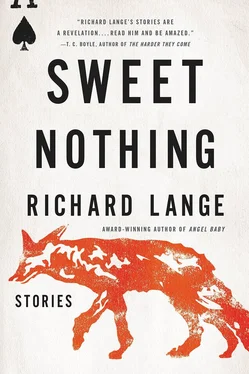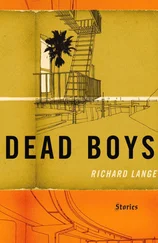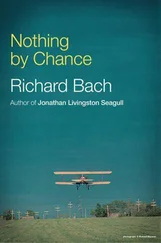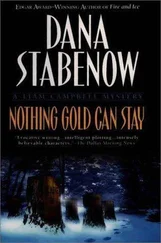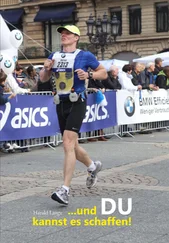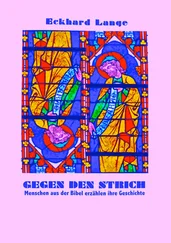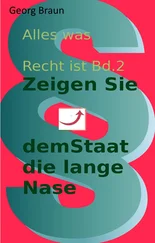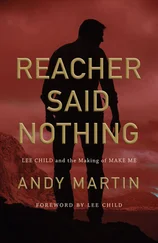Brewer stands at the break in goggles and bandanna, hose in one hand, rake in the other. His eyes sting from the smoke, and it’s impossible to draw a deep breath without coughing. The heat increases as the fire pushes closer, and the exposed flesh on his forehead feels tight enough to tear.
If he thinks of all of it at once, pauses to acknowledge the intensity of the blaze, the heat, the choking smoke, he’ll cut and run, he knows it, and die in a futile scramble for safety. So instead he focuses on individual flames and wayward sparks, moving from task to task, head down, humming that damn song, the one about the doggie.
An ember sails across the break on a gust of wind and lands in a clump of dead weeds. Brewer drags the hose over and douses the flare-up, then spots another and soaks that too. He replaces the doggie song with Hamlet’s soliloquy “To be or not to be…” Not his favorite speech, not his favorite play, but something he memorized as a young man because even the roughnecks he worked with in the oil fields recognized it as something fine and would reward him with whiskey and backslaps when he stood, deliriously drunk, and recited it in those long-ago jukebox honky-tonks that were their only respite from day upon hellish day on the rigs.
He’s up to “the rub” when a sage bush inside the perimeter catches fire and ignites a mat of brittle grass that stretches all the way over to where his truck is parked. By the time he pulls the hose into position, the ground beneath the vehicle is on fire. His legs shake as he squeezes the pistol-gripped nozzle and aims the stream of water at the flames. Two of the truck’s tires explode, but he manages to extinguish the blaze before it does any more damage.
A step back, a clattery breath, and out of the corner of his eye he sees that the old oak that shades the trailer, a tree he should have cut down years ago, would have if he hadn’t been moved by its gnarled dignity, is suddenly aflame. He’s soaked its branches half a dozen times since hearing of the approaching fire, but the air itself is thirsty in this parched place, so, despite his precautions, the tree is dropping burning leaves onto his home.
He climbs onto the picnic table next to the trailer and sprays the roof and the branches above it, which are laced with orange flame. He’s making progress, but then a blazing limb gives way with a loud crack and crashes down onto the trailer.
Brewer hops off the table and retrieves the rake. He hooks the limb with the tool and yanks repeatedly in an effort to dislodge it. The stubborn tangle of smoldering branches comes loose all of a sudden, throwing him off balance, and he falls backward and brings the limb down on top of himself. He scrabbles wildly to get free of the burning cage, then snags the limb with the rake and drags it across the yard.
The fire is lapping at the break on all sides now, and the intense heat ripples the air, giving the blaze the ghostly quality of something seen through an old, warped windowpane. Thick, black smoke rolls over Brewer in choking waves, and the sharp pop and crackle of flames chewing through the chaparral plucks at his nerves. He opens his mouth to yell, to prove he’s still here, but only a ragged cough comes out.
Next time, I let it burn, he thinks, and staggers toward a new flare-up that’s bloomed inside the perimeter.
PAPÁ AND THE taxi driver talk like old friends as they zip past concrete-and-cinder-block dental clinics, auto-repair shops, and twenty-four-hour pharmacies. All the buildings look like they’re either half finished or on their way to falling down, and music blasts out of every open door. A man in a dirty chicken suit dances in front of a restaurant, beckoning passing cars.
The stink of burning trash in the air makes Miguel nauseous. Or maybe he’s carsick. He tries concentrating on the CD dangling from the rearview mirror of the cab, watches it twirl and flash, but that only makes him feel worse.
They turn off the pavement onto a deeply rutted dirt road that leads up a steep hill past shacks pieced together out of cardboard and corrugated tin, scavenged wood and plastic tarps. It’s even more pitiful than Durango. Look at the garbage piled in the street. Look at the women washing clothes in a muddy stream. Vatos with tattooed faces bend to peer into the taxi as it passes, and the driver locks the doors.
The cab stops in front of a house that’s a little nicer than the rest, with four solid walls and glass in the windows. A satellite dish perches on the roof like a vulture, and a new gas grill takes up most of the dirt yard. Papá climbs out and knocks on the door. A woman clutching a naked baby answers and talks briefly with the old man, stepping outside to point down the road.
The cabdriver turns in his seat to address Miguel. “You like L.A.?” he asks in English.
“It’s okay,” Miguel replies.
“I live there ten years,” the driver says. “I like the money, but Mexico is better for me.”
Miguel doesn’t understand how that could possibly be.
Papá returns to the cab and tells the driver to go to the end of the street and make a left. They stop again, in front of a windowless concrete building with a Corona logo painted on the side.
“Cuidado,” the driver says when Papá gets out of the cab. Careful. Miguel gets out too, because he’d rather be with his father than the driver if something goes wrong.
The only light inside the building comes from a dozen strands of Christmas bulbs strung across the ceiling. Their blinking reveals a glass-doored refrigerator stocked with beer and a wooden shelf lined with bottles of tequila. The place is a cantina of some sort, judging by the white plastic tables and chairs scattered about. A little man in a red apron is sitting on an overturned bucket next to the refrigerator. He stands when Miguel and his father enter, his eyes full of questions.
The only customer is a dark-skinned drunk in sweatpants and a Chivas jersey who looks to be asleep in his chair.
“Chango,” Papá calls out to him.
The drunk squints at the old man, drinks from a bottle of Modelo, then lets his chin drop to his chest again. Papá walks over and kneels beside him, grabs the arm of his chair, and shakes it.
“¿Qué pasa?” El Chango mumbles without lifting his head or opening his eyes.
The old man asks about Alberto and Maria, explains that they were supposed to cross last night. It’s difficult for Miguel to hear what he’s saying because he speaks so softly, almost whispering into the coyote’s ear. A fly buzzing around the room is louder than he is.
El Chango frowns and shakes his head, eyes still closed. He reaches out and tries to push the old man away. Papá’s face hardens into a mask Miguel has never seen before. “Listen,” he says. “You know El Teo, right?”
The name is a mystery to Miguel, but El Chango has heard it. He opens his little red eyes and looks Papá up and down.
“You better talk to me, or you’ll soon be talking to him,” the old man says.
El Chango grunts and licks his thick lips. He tugs at his jersey and has another sip of beer. “We set out at dusk,” he begins, then slurs out the story of how he led Alberto, Maria, and two other pollos, young boys, across the border and up into the scrubby hills of the U.S. side. He knew about the fire, could see the orange glow of it in the distance as they trudged along, but that seemed to him a good thing. The border patrol would be forced to pull back, and the crossing would be an easy one.
The wind, though, fuck, who can predict that? It changed in an instant and sent the flames racing toward them. El Chango hurried the pollos along, but the pregnant girl slowed them down. When the smoke thickened and sparks began to fall like burning rain, the group insisted they turn around. El Chango climbed to the top of a hill and looked back the way they’d come to see if this was an option, and, Mother of God, he couldn’t believe his eyes: a sea of fire now blocked any retreat.
Читать дальше
